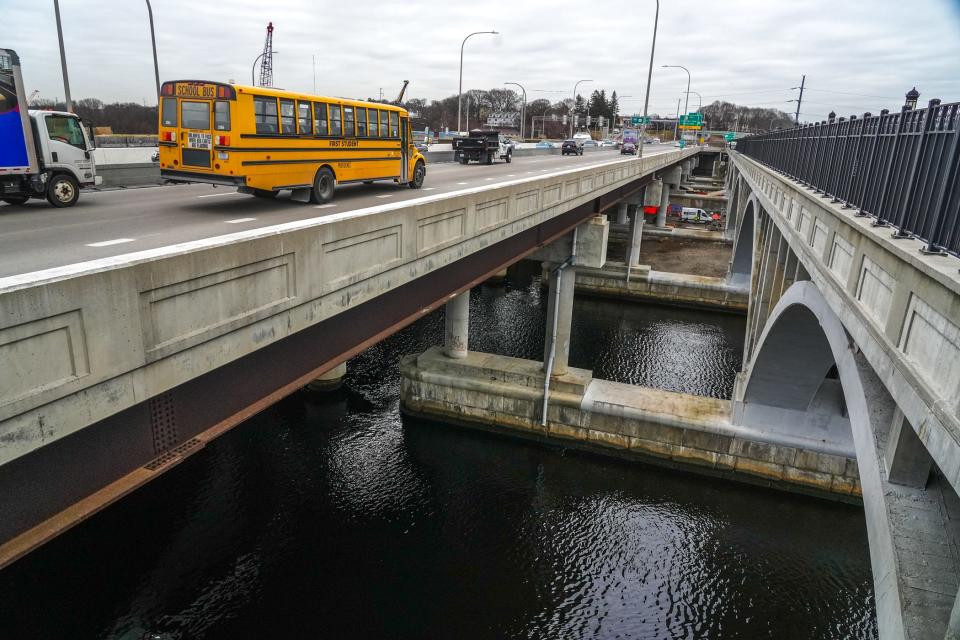Questions remain about Washington Bridge closure after email release. What we want to know.
PROVIDENCE – Did anybody at the highest ranks of state government communicate between the Friday that an alarmed engineer emailed about potentially catastrophic defects in the Washington Bridge and the Monday the bridge was abruptly closed?
As improbable as it might seem, there is no evidence they did in the 236 pages of emails the Rhode Island Department of Transportation gave The Journal in response to an Access to Public Records request filed on Dec. 15.
What's missing from the emails?
The emails contain no evidence that RIDOT Director Peter Alviti had any role in the urgent back-and-forth between consulting engineers and the department's own bridge team that Friday, Dec. 8, or that anyone communicated about the bridge over that weekend, or that anyone told Gov. Dan McKee before 2:52 p.m. the following Monday that Rhode Island was about to close a critical span on Interstate 195.
There is a lot that is not explained by the emails or the "exception log" that RIDOT didn't produce until Thursday, after The Journal demanded it, despite its being required by law.
An "exception log" is a detailed listing of every email, text, etal related to the APRA request that has been withheld, with the date, name of the sender(s) and recipient(s), the subject line and the reason each communication was put in a "don't disclose" pile.
RIDOT named Deputy Chief of Legal Services Siobhan Stephens-Catala as the person who decided what was public and what wasn't in The Journal's request, and who made the decision to charge The Journal $450 for the very same emails the McKee administration provided for free to at least one other media outlet that requested them two days earlier.
The only explanation RIDOT spokesman Charles St. Martin provided for that gaffe: "The documents the reporter was seeking had already been identified and compiled."
After intervention by McKee's office, RIDOT agreed to refund The Journal, saying "After reviewing complaints about inconsistent charging for APRA requests in this specific case, the governor has directed RIDOT to refund those outlets that were charged differing amounts for similar document requests this week."

St. Martin said DOT Chief of Staff John Igliozzi, a potential candidate for attorney general who held a fundraiser on the day after the bridge closed, had no role in deciding what was public or who should be charged what for records.
St. Martin did not respond, however, to questions about Alviti's unseen role in the conversation after the alarm went up on Friday, Dec. 8.
More significantly, however: the emails RIDOT made public did not include any post-Dec. 8 reports, any findings or any chat entries from the Teams video meeting held that Monday by the department's internal and external project managers and bridge engineers.
That leaves unanswered: who persuaded Alviti – who was the director of programs for the Laborers' New England Laborers' Health and Safety Fund before he was hired by then-Gov. Gina Raimondo – to close the bridge?
The Journal requested "all written communications, including emails and instant messages (Slack, Zoom, Teams, etc.)" relating to the bridge that went back and forth between RIDOT staff, its bridge contractors, the governor's office and the U.S. Department of Transportation/FHWA. It got emails only.
More: Emails show initial warning, response to Washington Bridge damage
What was withheld?
The 26 emails that were withheld do not appear to answer any significant questions, including: where was Alviti? What happened that critical weekend when the emails stopped?
The "exception log" lists 26 emails from Dec. 8-13 that were withheld under an exception within the state's Access to Public Records Act that allows the withholding of "preliminary drafts, notes, impressions, memoranda, working papers, and work products ... whether in electronic or other format."
More: Timeline of the Washington Bridge closure: Here's how it all happened
There are no emails produced – or withheld – over the weekend after RIDOT was put on notice by Andrew Prezioso, a structural engineer working for bridge design contractor VHB, of potentially "catastrophic" bridge defects as they were later described by Alviti.
The following describes emails that were withheld:
Friday, Dec. 8: Withheld emails containing 9 pages described as: "preliminary draft images" shared between Andrew Prezioso, the VHB engineer who sounded the alarm, and RIDOT Project Manager Anthony Pompei.
Monday, Dec. 11: Two withheld emails, to and from McKee staffers and RIDOT communications staffers, described as "draft media advisories."
Tuesday, Dec. 12: Only one of the four withheld emails goes beyond a draft news release. Exchanged between Steve Pristawa and Peter Pavao, it is described as a "preliminary draft concerning two lane-crossover impacts."
Wednesday, Dec. 13: 19 emails withheld, including several described broadly as "draft response concerning local bridge costs," "Draft Washington Bridge alternate routes" and "Draft Washington Bridge crossover striping plans."
State law requires that any denial of the right to inspect or copy records "be made in writing, giving the specific reasons for the denial within 10 days of the request."
This article originally appeared on The Providence Journal: Emails leave major gaps in what led to Washington Bridge closure decision

